The Top 10 Tips to End Homework Battles With Kids
The homework battles all started in Kindergarten! Yes, that young!
After agonizing over which school we should send our oldest son to, we decided on a brand new traditional school that was being built a mile from our house. It had a Positive Discipline model, lots of structure that we thought would benefit his hyper little body, and they taught in a similar way to how my husband and I learned.
However, while looking more closely at reviews, the number one complaint was the amount of homework given.

This post contains affiliate links, see disclosure policy for details.
I really didn’t think it would be that bad.
And I was wrong.
The amount of work wasn’t actually the problem, although, there was quite a bit. It was my approach and being unaware that my son is something that is known as Twice Exceptional. I was metaphorically squeezing him into a teeny tiny box. All the while, he was BUSTING out of it probably trying to figure out how he could create something with it. Ha!
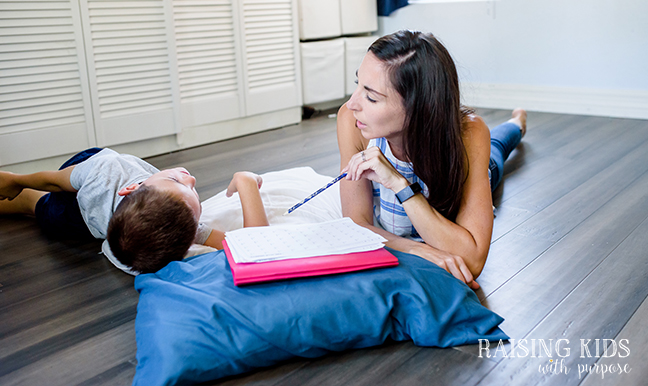
There were a lot of tears. Mostly from me because the frustration would boil over causing me to be a sobbing mess. I tried rewards such as (dye-free) gummy bears and stickers. I would sit right next to him repeating myself over and over again.
It was painful.
Now that I look back, there is no wonder he was so resistant, annoyed and more frustrated than I was! Thankfully, we have repaired that damage!
Bonus! Sign up for the Raising Kids With Purpose Newsletter and receive The End Homework Battles Toolkit for FREE! The toolkit includes a Homework Plan Worksheet, Top 10 Tips Poster, a Daily Homework Checklist and a Homework Supply List.
Table of Contents
The Benefits of Homework
A few years ago, I was listening to a podcast where the author made a comment about how homework doesn’t even contribute to learning. Shortly after, I came across Alfie Kohn’s stance on homework and he states, “The fact is that after decades of research on the topic, there is no overall positive correlation between homework and achievement (by any measure) for students before middle school – or, in many cases, before high school.”
I threw my hands up in the air with the attitude of, “Well, that’s it! I’m not even going to make my kids do homework anymore. I’m sick of the homework battles anyway.”

But being the research-a-holic that I am, I did a little more digging.
It appears that the experts and researchers in the field of education can’t quite agree if this is true or not. There are too many variables at play such as developmental capacity, the type of homework, parental involvement, the amount, and the list could go on.
Another thing to consider is that even if homework does contribute to learning, it’s taking away free time and play. Young kids discover the world through play so to take that away can be detrimental to their development.
Something we do know is that homework can help a teacher gauge where a child is in terms of progress toward knowledge, and it can also contribute to more skills other than learning. This did get my attention because teaching life skills to our kids while they are young and in our safe environment is what parenting is all about to me.
Skills learned by doing homework:
- Accountability
- Time Management
- Self-Discipline
- Motivation
- Goal-Setting
- Delayed Gratification
- Critical Thinking Skills
- Independence and Self-Motivation
- Study and Note-taking Skills
- Following Directions
- Responsibility
- The Joy of Hard Work
- Perseverance
End Homework Battles

I didn’t realize there was another way to do this whole homework thing. I was the one causing way more problems than solutions. After taking a step back from all the tension, I realized there was a power struggle for autonomy happening.
In The Self-Driven Child by Dr. William Stixrud and Ned Johnson, the very second chapter is titled, “I Love You Too Much To Fight With You About Homework” The Parent As Consultant.
At first, I thought it was peculiar to have a chapter about homework at the very beginning of a book on childhood autonomy. After reading it though, I found it to be the perfect example of how we should view our role as parents – as a consultant, not manager and definitely not dictator.
Immediately, I started putting what they mentioned in practice.
The authors were spot on!
The battles (of two years!!) stopped, the tears dried up and my son started to be self-motivated!
Just the other day, he realized he had to recite a poem that was due the following day. We didn’t nag or remind him. As a result, he got to work and was able to say the whole thing in class the next day without any help. Would I have preferred that he didn’t procrastinate? Yes. But that’s not my choice to make.
Since reading The Self-Driven Child, I also read The Gift of Failure by Jessica Lahey and No Drama Homework by JoAnn Crohn. With all the amazing information, I started implementing their tips. It has made such a difference in our relationship and especially in our boys’ self-motivation and independence.

The Top 10 Tips to End Homework Battles
The goal with all of this is to let our kids lead their own lives and be self-disciplined. Homework is a great place to start in allowing our kids to develop competence and become more resilient. If we do the work for them, we, in turn, make them weaker.
Here are the top 10 tips that really helped end homework battles:
1. Define What Homework Is (And Isn’t)
What the heck is homework for anyways?
If we start by realizing what the purpose of homework is and how it should be completed, we can continue to fall back on this if it starts to be something that it’s intended to be.
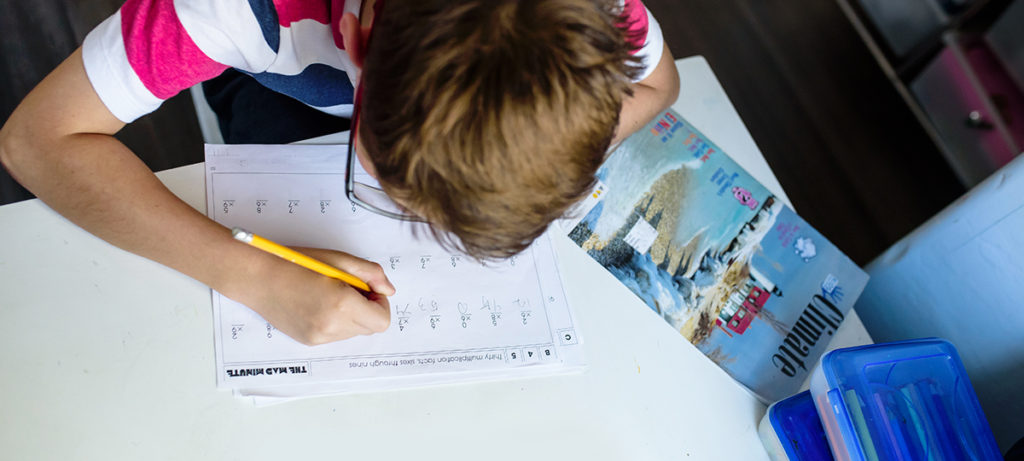
The Purpose of Homework
When googling the question, “What is the purpose of homework?”, there are many websites that answer this question such as Psychology Today, The Association for Supervision and Curriculum Development, and even Crayola. After reading through what many of the professionals and experts had to say, this is the conclusion I came to:
The purpose of homework is to reinforce what was taught in class and result in meaningful learning.
With this in mind, we can determine if our child’s homework is appropriate or inappropriate. And if it’s the latter, don’t feel afraid to speak to your child’s teacher.
How Homework Should be Completed
According to an article on Princeton University’s website, ” only a certain amount of processing of information occurs in response to hearing information presented.”
And this is all dependent on the type of learner your child is. By doing homework at home, learning can be reinforced in a different way.
Kids should also be able to complete homework independently.
This means that if a child is unable to read, then he or she probably isn’t ready for homework that requires reading yet. This is not how it’s viewed at my children’s school and I’m sure they have their reasons. As a result, I did see that my kids weren’t able to work on many of the skills listed above like self-discipline or responsibility because they had to depend on me. And at that age, we need to encourage play and discovery in the small amount of time they have left in their day.
When a child can complete the work at home by himself or herself, even more learning will be strengthened which again, is the whole point.
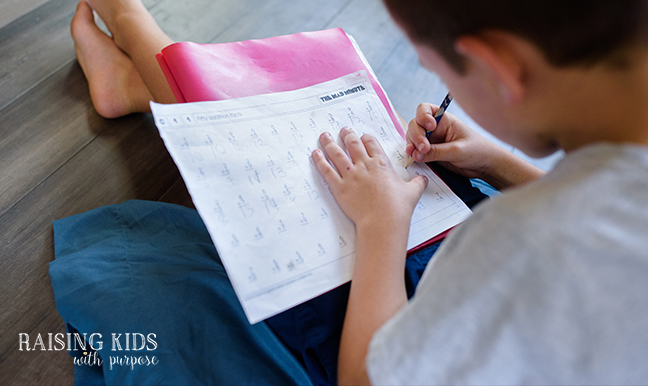
Lastly, homework should also be completed with the teacher’s expectations in mind.
Set and understand what the teacher’s expectations are and reinforce those with your child.
Even though our school is pretty uniform in the instruction and homework given, each teacher does have slightly different rules and requirements for homework. Reiterating these with your child will help them be successful in accomplishing the purpose of homework, therefore, eliminating those awful homework battles.
2. Rule Out Any Learning Challenges
If your child seems to be sitting there and physically unable to get the pencil moving, it may not be because she is lazy or even tired. She may have a learning or developmental challenge. Or if they don’t seem to remember anything they learned in class, there may be a vision or hearing problem.
We had no idea our child had learning and attention issues AND needed glasses. Once we figured this all out, we were able to give him the accommodations he needed. I would get incredibly frustrated watching him sit there and do what I perceived as nothing. Thankfully, those feelings diminished once I was aware of what was going on. Then, I was able to be constructive instead of destructive.
Understood is an incredible resource for kids with learning and attention challenges. This article, “Why Kids With Executive Functioning Issues Have Trouble Starting Tasks“ opened my eyes to the effects of chemicals in the brain and task initiation.
The power of knowledge and awareness, I tell ya! It can change everything.

3. Make Sleep a Priority
Thanks to modern-day society, kids are getting less and less sleep.
Quality sleep helps kids focus and it helps increase learning. Research has shown that even increasing sleep by 27 minutes can help with focus and reduce inattention challenges.
According to Parents, “[Sleep] is when the body repackages neurotransmitters, chemicals that enable brain cells to communicate. And experts have recently been able to demonstrate that sleep allows brain cells to “take out the trash” each night, flushing out disease-causing toxins.”
4. Realize Homework Is OUR CHILD’S Responsibility
Let’s say it together:
Homework is my child’s responsibility, not mine.
This is what really released me feeling like I needed to be a homework dictator! If I’m making sure the homework is getting completed and constantly nagging, I’m making the responsibility mine.
And do you remember some of the skills that are learned through homework? Most of them cannot be achieved if I’m hovering over my child and making sure it gets in his backpack and eventually to school.
“It may seem harmless to step in, but the damage is cumulative. Every time you take over, and rescue your child from working out a challenging math problem or thesis statement on her own, you undermine your child’s sense of confidence and autonomy.”
Kids learn through failure and natural consequences. If I make homework my responsibility, they will never have an opportunity to learn how to recover from mistakes.
Read Next: An Easy Way for Kids To Pack School Lunch
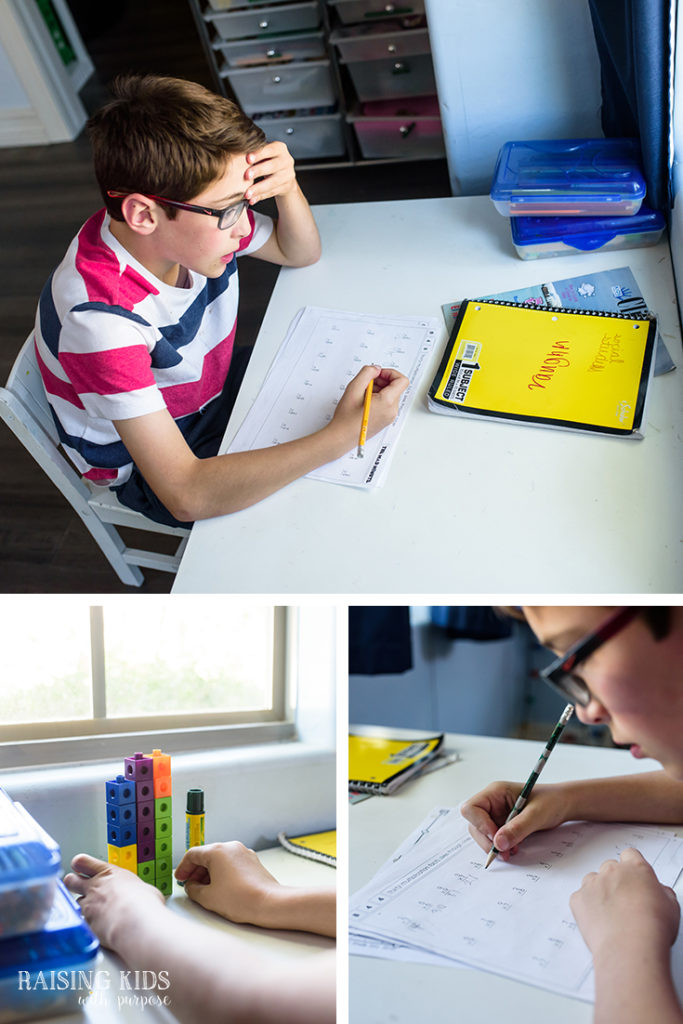
5. Have a Plan
Come up with a plan together. Or better yet, give your child complete ownership over the plan (because it is his or her responsibility after all *wink wink*) and you can help if needed.
I had it in my head that the homework needed to be done immediately. My son had a different opinion. Before he would even walk into the house, a power struggle ensued. He needed a BREAK after school, whereas, I wanted to ensure his homework got done so he could have the rest of the evening to relax and create. In all honesty, I probably just wanted to be off the hook, too.
The Plan Could Involve:
- Food! Fuel up and hydrate
- What to do as soon as they walk in the door
- Location for their homework folders or packets
- Location for a “Homework station”
- Supply Bins and a list of what they will need
- The time they will start their homework
- Anything else needed to complete homework such as timers
DOWNLOAD: Free Homework Toolkit
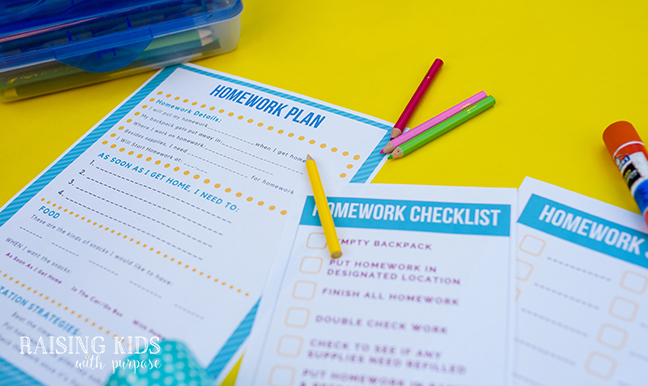
By handing over the responsibility to your child to eliminate homework battles, this does not mean you can’t or shouldn’t help. Something I started doing was saying,
“Hey! Let me know if you need any help with homework tonight. If so, let’s come up with a time so I can plan around it.”
If they don’t want you to work with them then that’s their prerogative. One of my sons didn’t want my help until he did poorly on a test. During the following week, he asked if I could study with him. Of course, I told him I would. Then, we came up with a time that worked best for both of us. We didn’t have any homework battles! Woot Woot!
Remember, the responsibility is ultimately our child’s, not ours.
6. Create an Effective Learning Environment
Find a spot in your house where your child works well. And remember, just because you prefer a certain work environment doesn’t mean that it will work best for your child.
In the books I read, they recommend that you find a space with zero distractions. Focus these days is hard to come by even for a neurotypically developing child, let alone, one with attention deficits.
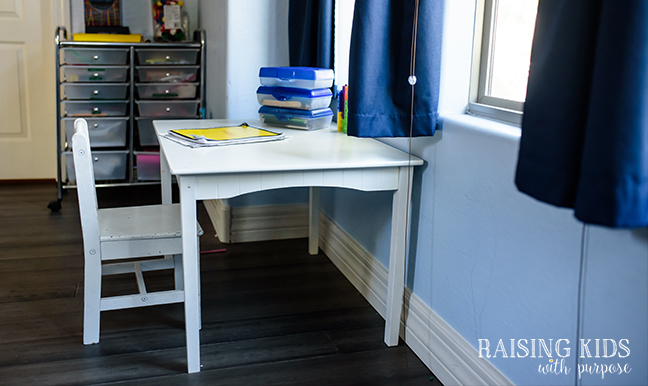
What I’ve found is to look specifically at your child’s individual needs. For example, we have one son who requires external stimulation. One day, we practiced spelling words while he was listening to a book with one earbud in, moving in his swivel chair, and creating something with a 3D pen. The crazy thing is that he spelled more words correctly while doing all those things than when he was sitting with no distractions! On the other hand, our other son needs a quiet space free of any clutter.
Suggestions for homework spots:
- On a bed
- At a desk
- At the kitchen table
- Outside at a table or in a comfy chair
- On the floor
- At the local library
Another great tip I read was to use a tri-fold poster board to keep the child separated from distractions if that’s what they need!
Ask your child what he prefers. Check in with him or her every few months to see if it’s still working, if not, change it up!
Quick Tip! To end homework battles, use my Free Printable Homework Toolkit that includes a Homework Plan, Top 10 Tips Poster, Homework Checklist and Homework Supply List.
7. Teach Organization and Strategy
Homework is an opportunity for your child to learn how to organize materials and organize time. This is often done by coming up with a strategy.
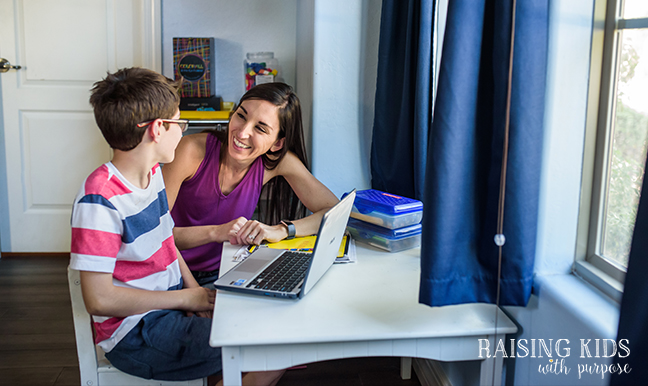
Strategies That Will End Homework Battles:
- Use a planner to keep track of all the assignments and when they are due. Checklists and routine charts can also be a great tool to teach organizational skills.
- Determine if help from an adult will be needed. If so, decide on who will help and what time. Before starting, determine what is most important and or the “hardest” task. Self-control is a limited commodity and your child will most likely have more towards the beginning of homework time. Hence why it is best to start with the hard stuff first.
- Estimate how much time each task will take to complete and use a timer for accountability (and accuracy of that estimation). *We LOVE these ones!
- Establish a system where the child checks his or her own work after it is complete.
- Have a homework supply box so there’s no need to disrupt work time to find a sharpened pencil or ruler.
- Have your kids come up with a “home” for their backpacks and help them create a habit to put the homework away as soon as they are done. This will cut down on running around like chickens with their heads cut off in the morning. We use a big bin in the shoe closet and soon will be building custom lockers!
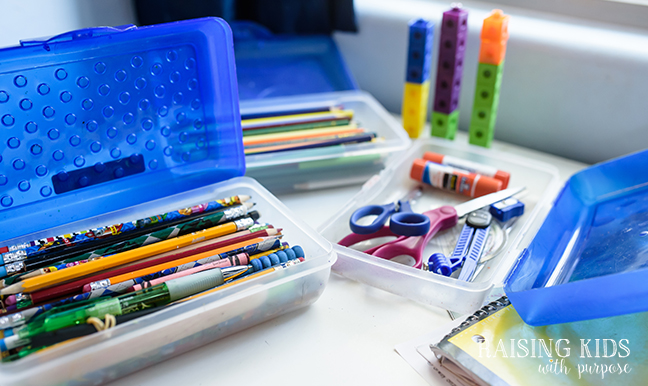
Time Management Strategies
A great way to teach time management skills to kids is with what Jessica Lahey refers to as The Timer Cure.
This teaches kids how to budget their time. Have them estimate how much time a particular task or subject takes to complete. Cut that time in half and set a timer for that amount of time.
For example, if a math worksheet typically takes an hour, set a timer for 30 minutes. Tell the child that once the beeper goes off, then the math worksheet time is done and he needs to move onto the next assignment. Keep the timer visible so they can see it counting down. Unless the child has learning or attention issues or anxiety, as mentioned above, he or she will typically beat the clock!
Talk to the teacher about this tactic first to make sure he or she is okay with the homework assignment not getting completed. For my son who has a 504 Plan, we utilize this strategy which has worked pretty well. At first, I thought he would use it as an excuse to not work as hard since he could stop after a certain amount of time, but it did the opposite.
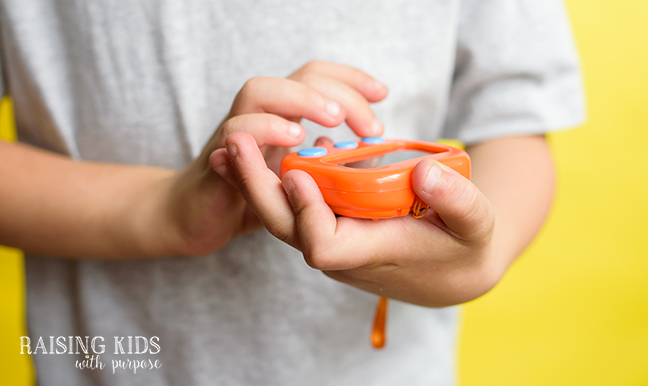
Chunking
This is a great strategy to teach kids who have a tough time getting started or find the work to be challenging.
The child takes the homework assignments and breaks them down into manageable “chunks”.
- Piles – Put each assignment or worksheet into a separate pile and work on one pile at a time.
- Relatedness – Assignments can be sorted by relatedness such as written work, computer work, and more hands-on projects.
- Subject – Work on one subject at a time
- Due Date – Teach your child how to prioritize by working on the assignments that are due the soonest first.
Individual assignments can be broken down into even smaller chunks. The whole point is to make the task seem doable instead of so overwhelming that it’s hard to even start.

8. Call In Reinforcements
If the homework battles don’t seem to cease, then find someone else who can work with your child. Kids often listen better from a peer or someone just slightly older than him or her. They can feel a stronger connection or not have the need to fight back.
9. Discover Intrinsic Motivators
Before becoming a brain-compatible parenting research junkie (I don’t think that’s really a thing but in my world it is!), I thought rewards and praise were how you motivated a child to do something.
I was wrong.
In this post, I go into the hindrances that praise can actually cause. This also can go for rewards. Well, it may not damage the child and cause them to enter a psych ward or anything, but rewards don’t motivate in the way we think they do. Instead, they extrinsically motivate which means as soon as the reward is taken away, there is no desire left to continue doing that behavior, action or task. So instead, we should focus on doing things that intrinsically motivate our kids to want to do well or in this case, get their homework done.
Intrinsic motivation is doing something for the inherent enjoyment or satisfaction, but not for a separable outcome like a physical reward.
Thankfully, we have one child who loves homework so there is no external push needed from us. The other, however, would rather go scoop poop for a neighbor’s dog. Ha!
Sometimes rewards can kick start motivation, but because the effects wear off so fast, we need to be cautious not to rely on them. For example, using a sticker chart for potty training a two-year-old can work to jump-start the motivation to go in the toilet but as soon as they do, praise the action and empower the child with phrases like, “You did it!” Then they become proud of themselves and want to use the potty independently.
Intrinsic Motivators For Homework
Below are some things that you can do get your child to a point where they are intrinsically motivated to do homework instead of only completing it because you gave them a gummy bear. Well, you may not have used gummy bears, but I sure tried!
- Encourage your child to work on what she is interested in first. As mentioned above, have your child prioritize and pick what is hardest first. However, if there is zero motivation to do anything, have her work on what she’s most interested in. Doing this will give her a spike in the motivation biochemicals in her brain that may last enough long enough for the remaining subjects.
- Acknowledge when your child masters a task or accomplishes an assignment that was difficult. Avoid using praise like, “Good job” but instead, praise the effort and hard work.
- Give your child autonomy. This has already been discussed, but allowing your child to be in control over his or her decisions of when to do homework, what and how to finish it, there will be greater motivation and maybe even desire to get it done.
- Help them find joy in what they are doing. Point out parts of the homework that are linked to what they are good at or interested in.
- Point out one of your child’s strengths that will help them to complete the assignment.
- Give positive feedback and encouragement. Try to refrain from over-correcting or giving negative feedback. Instead, encourage your child to check his own work and encourage him to keep working hard.
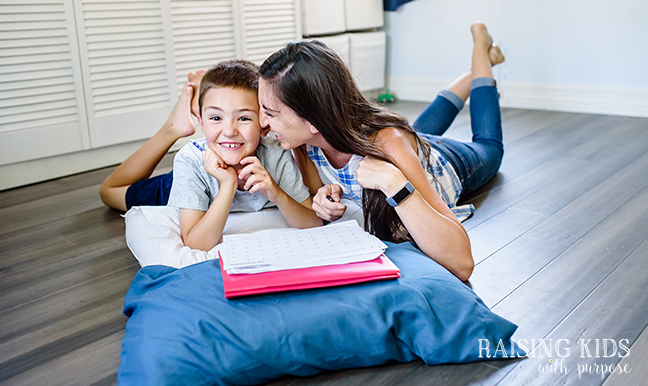
10. Stay Focused on the End Game!
Getting caught up on each homework assignment can cause more and more power struggles. Instead, keep your focus on the end game and what you hope to accomplish.
This reminds me of my friend Amy Carney who wrote a whole book with this message. In Parent on Purpose, she talks about visualizing the end. If we were to sit down at our child’s 18th birthday and watch the actual story of his or her life, not just the highlight reel, how would we feel? Do you think all the arguing, yelling and maybe even tears over homework battles is what we would care most about?
Probably not.
When we really think about it, what do we what to accomplish in our parenting journey with our kids as they develop into self-sufficient adults? Our list will probably be filled more with all the skills listed above on what homework teaches than nagging and feeling like it’s a fight to get our child to complete and turn it in.
The long-term goals should be for your child to develop a growth mindset, be independent, become competent, diligent and accomplish great things with the precious time they’ve been given to live in this world.
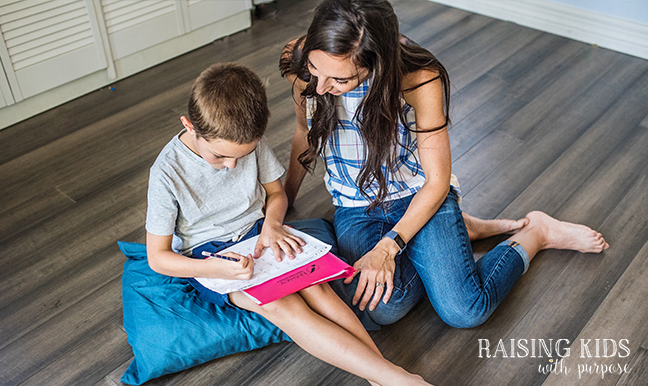
Ending Homework Battles is Easy Peasy!
Right? Seriously though, with the right mindset, homework time doesn’t have to feel so straining. Talk to the teacher if you feel like your child is unable to complete it on his or her own, that it’s not reinforcing what was taught in the classroom or it is taking way too long.
Depending on the school, your teacher may be able to work with you and the student to ensure that it’s beneficial and not just busy work that’s taking away family time at home.
The Top 10 Tips!
In conclusion, let’s review the Top 10 Tips to End Homework Battles:
- Define what homework is (and isn’t)!
- Rule out any learning challenges and come up with a plan to accommodate your child if there are any.
- Make sleep a priority.
- Realize homework is our child’s responsibility, not ours!
- Have a plan.
- Create an effective learning environment.
- Teach organization and strategy skills.
- Call in the reinforcements.
- Use Intrinsic Motivators.
- Stay Focused on the End Game.
Download Your Free End Homework Battles Toolkit!
- Download the toolkit | Join me to receive my newsletter and as a thank you, receive the pdf files. If you haven’t filled out the form, click here to subscribe!
- Print the files | It works great to print onto cardstock but any paper will do. After you print, cut the half sheets.
- Laminate | Laminating the half sheets works well so you can use a dry-erase marker and reuse the checklists. If you want, you can laminate the Homework Plan after it’s filled out so that it stays in good shape. Keep it at the designated homework spot as a reminder.
- Use and update the plan | As the kids get older or make changes to their plans, update it and hang at the homework station.
What Is Homework Time Like For You?
If you have any questions or comments please feel free to drop a comment below!!!








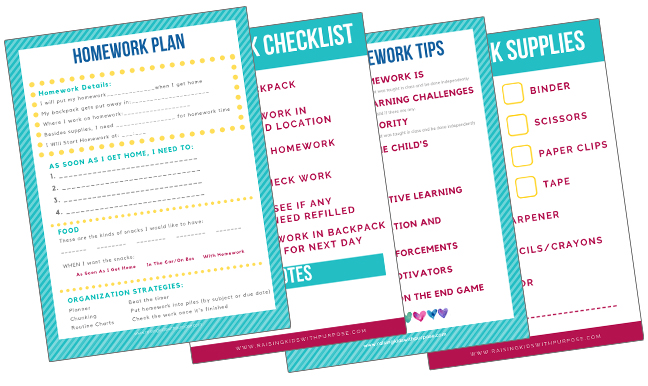
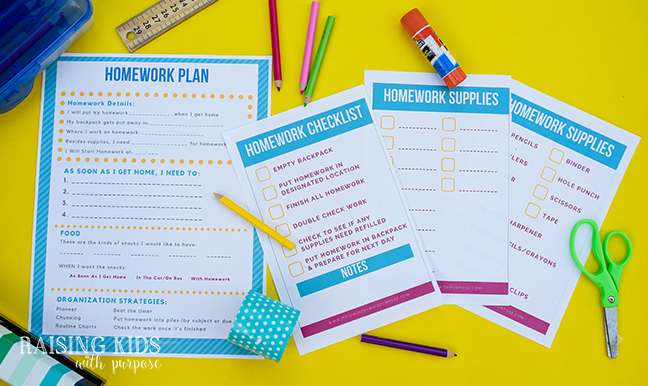
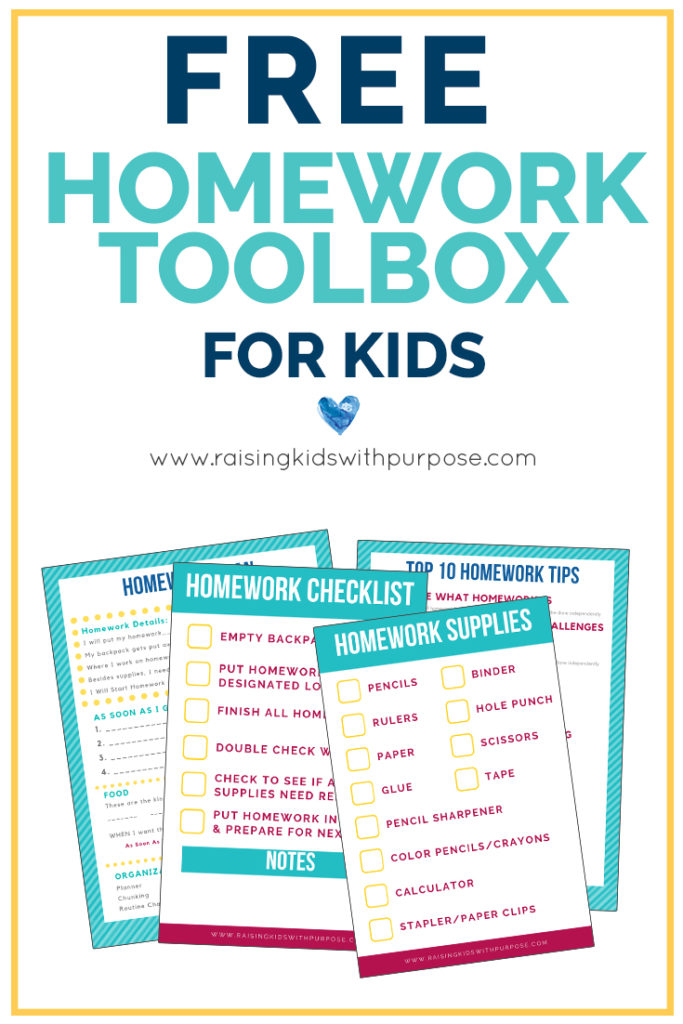






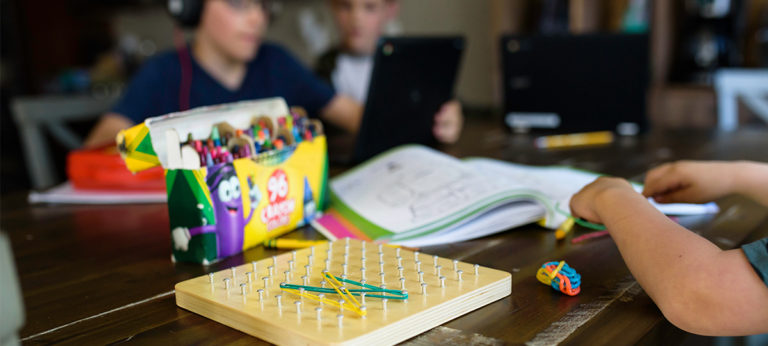
Lots of great information! Thanks!
Thanks!
Good tips here. I’m a fan of homework myself as it can teach the children about sense of responsibility, time management and discipline.
I’m slowly warming up to the idea. LOL!
This is really great. I struggle every day with my son sitting down to do homework. He really puts it off and I don’t blame him. These tips will really help me as a guide
Oh good! They have helped us so much!
I love that you say have a plan! And I love that it includes having a snack because I think so often we make the kids hit the ground running as soon as they walk in the door and who wants to do that? Not me… But a snack and some me time can really help them accomplish it!
I agree! I actually pick them up from school and have snacks in their cup holders as soon as they get in the van. My 7-year-old eats lunch at 10am!!! and doesn’t get home until 3 so food is a must. Hope the plan helps you!
I used to hate how long homework too when I was in school! These are awesome tips to tackle homework!
Thanks! I’m totally the opposite and LOVED Homework but now as an adult, I’m not a fan and it’s too hard. Ha!
these are excellent tips. saving this for the time we have our homework battles!
Yes they are time-saving tips for sure 🙂
Lots of great info .home work can be such again
LOL! Yes it can be a pain 🙂
My daughter just started Pre-K, and has some “homework” once a week – but I’m actually really dreading when she gets older when the real homework begins…
Already in Pre-K??? That’s so young!
Number 4 is my favorite! I love making sure they understand it is their responsibility.
That’s my favorite too! LOL! It seriously released me from feeling like I was failing if they didn’t get it done. And it freed up my evenings too!!
I love the idea of having a dedicated homework space as opposed to laying it all out on the kitchen table. My kids aren’t of homework age yet but to be honest I am kind of dreading it!
With this mindset though, there’s nothing to dread! It’s their responsibility 😉 And yes, having a dedicated space definitely helps!
Thank you for sharing. I do not look forward to helping my daughter with her homework. It’s bad. I know. At eight, she’s a know-it-all but wants my help. It’s tough
Awe! Let her take the reigns though! And if she wants your help come up with a time and parameters making sure it’s still her responsibility.
Great tips! As a mom of 6 I can say that they are all super important for sure! Organization is so key!
Yes! Very important!
Gah! The homework struggle is real Momma. I have 5 kids and each one of them have been different with how they approach homework. Going to give some of these a try with my 8 year old who has made the great big leap into 3rd grade. Thanks for sharing!
Isn’t crazy how every kid is so unique and learns differently? Hope some of these tips help as they have helped with us!
Wow – I LOVE this! My in-laws babied their son with his homework. Would even go as far as to do it for him so it was done – ridiculous. He’s one of the most unmotivated people I know and expects life to just be handed to him on a silver platter. They thought their ‘favor’ was helping him and it really just created a poor work ethic and more 🙁
I know someone who did the same thing. Her mom even helped her with homework through college and now with a degree she hasn’t been able to find a solid job for a few years because every time things get hard, she quits. It really isn’t helpful to do everything for our kids. I can’t harp on that enough! LOL! Thanks for sharing!
I can’t believe homework starts in kindergarten!! That’s next year for my little
For us it did! We have friends who go to a different charter though, and there’s barely any homework all throughout elementary. Only if that school was closer 😉 And I think our public school’s kinder didn’t have much homework. Praying that’s the case for you! I think schools should wait until they can at least read and comprehend well!
This is such great info! We definitely have struggles with our 7 year old and homework. Thank you for sharing this!
You’re welcome! Hope it helps!
I love this post! Such great insight. I love that “you are a consultant, not a manager or dictator!” I will definitely remember that and put it to use. Great tips!
-Jennifer
My kids respond so much better to things when they are in control (or at least feel like they are in control of their own lives).
Homework and chores can definitely be a battle! It is so frustrating to have to deal with this all the time. I like your tips – thanks!
Thank you! I’m so thankful it’s not a battle anymore! At least for now 😉
These are great tips on How to battle homework issues. I’m definitely gonna try to use these with my kids.
Let me know how it goes!
Love and needed to read this. Love the pictures. Thanks for sharing
Thank you!
This is very timely. This is my personal predicament right now and yes, the amount of homework is a big concern for us. Thank you so much for sharing these tips. Super helpful. Will definitely apply them.
I’m so happy these tips can help! They have completely transformed homework time for us!
Really?! I know, this time two years ago, we were STRUGGLING! I’m so thankful for all the resources I found to help us overcome the homework battles, for sure!